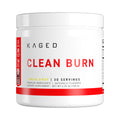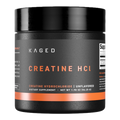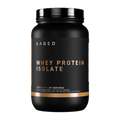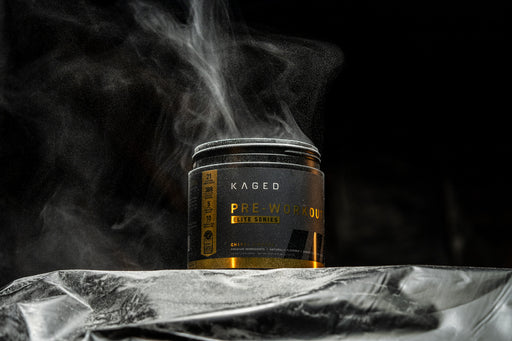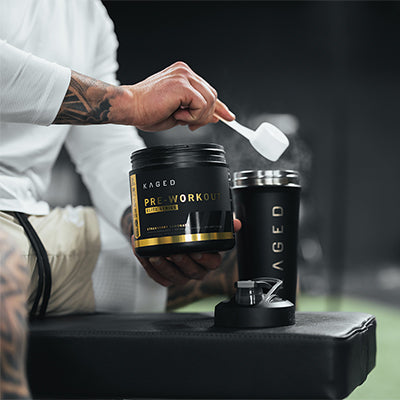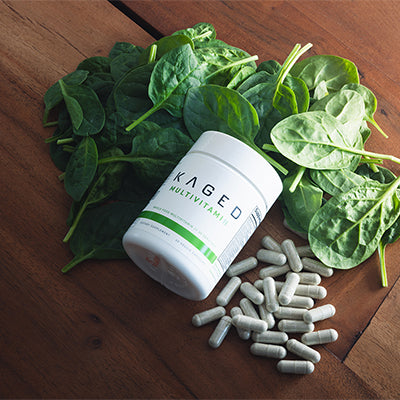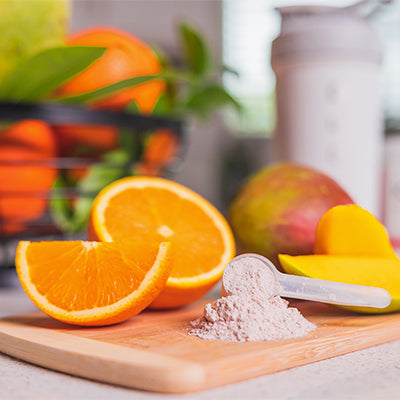One of the defining traits of any great pre-workout supplement is its ability to increase blood, and therefore, your muscle pumps.
(After all, if you just wanted energy, a cup of coffee would get the job done.)
There are many ingredients, from amino acids to specialty blends, that companies will promote as supporting blood flow by increasing nitric oxide synthesis. Two of the most popular, probably the two most popular, are the amino acids arginine and citrulline. Of these, you’ll see many forms, but l-arginine and l-citrulline are the most common forms, so we’ll stick with those for today’s discussion.
However, while they share a common goal, the way L-arginine and L-citrulline function in the body is different, and that leads to different outcomes in effectiveness and outcomes.
In All Kaged Pre-Workouts, We Only Use L-Citrulline, Never Arginine. In This Article, We’ll Show You Why.
But first, let’s talk about why ingredients to support blood flow and nitric oxide synthesis are a staple of pre-workout supplements, like Kaged Pre-Workouts.

The Role of Nitric Oxide in Workouts
Nitric oxide (NO) is a naturally occurring molecule in the body that plays a pivotal role in cardiovascular and muscular health.
One of its primary functions is to promote vasodilation—the widening of blood vessels—which allows for increased blood flow.
When you exercise, your muscles require more oxygen and nutrients to perform at their peak. By enhancing blood flow, NO ensures that these vital resources are efficiently delivered to working muscles, helping you push through more intense and longer workouts.
The benefits of nitric oxide don’t stop at improved blood flow. Increased NO levels can also lead to enhanced muscle pumps, the full, tight feeling in your muscles that many athletes seek during and after training. This boost in blood flow also improves nutrient delivery, helping muscles recover faster post-exercise.
In sum, here are the benefits…
-
Improved Muscle Pumps*
-
Improved Muscle Endurance*
-
Improved Muscle Recovery*
-
Stronger Mind-Muscle Connection*

What Are L-Citrulline and L-Arginine?
L-citrulline and L-arginine are both amino acids. Neither of them are essential amino acids, which means our body is capable of making them. With that said, supplementation is the only practical way to get them at doses necessary for performance.
(For example, a typical serving of watermelon, which is abundant in citrulline, provides about 0.2 grams. Kaged Pre-Workout contains 6.5g, or 32x a serving of watermelon.)
While they share a similar goal—boosting nitric oxide levels for improved blood flow and workout performance—they differ in how they work within the body.
L-arginine is an amino acid that directly contributes to nitric oxide production. It serves as the raw material for nitric oxide synthase, the enzyme responsible for generating NO. This makes L-arginine an obvious candidate for supplements designed to increase NO and improve vasodilation.
L-citrulline, on the other hand, is an amino acid that is indirectly involved in nitric oxide production. When you supplement with L-citrulline, your kidneys convert it into L-arginine.

The Problem With L-Arginine: Absorption
While L-arginine might seem like a logical choice for boosting nitric oxide levels, there’s a significant issue when it comes to its effectiveness as a supplement—absorption. When you take L-arginine orally, it faces a major obstacle in the digestive process.
Before it can enter the bloodstream and reach your muscles, L-arginine is broken down by enzymes in the gut and liver, primarily by an enzyme called arginase.
This pre-systemic breakdown drastically reduces the amount of L-arginine that actually makes it into circulation, limiting its impact on nitric oxide production.
Because of this, even though L-arginine is directly involved in nitric oxide synthesis, its poor bioavailability means that much of what you consume is wasted before it can do its job. This has led to a search for better alternatives, and that’s where L-citrulline comes in.
Why L-Citrulline is Superior: Efficient Conversion
Unlike L-arginine, L-citrulline bypasses the gut and liver breakdown process, making it a more reliable option for boosting nitric oxide levels. When you consume L-citrulline, it is absorbed into the bloodstream and transported to the kidneys, where it is efficiently converted into L-arginine. This conversion process allows for a steady increase in plasma arginine levels, which ultimately leads to higher nitric oxide production.
In fact, studies have shown that supplementing with L-citrulline is more effective at raising blood arginine levels than taking L-arginine directly. This makes L-citrulline the superior choice for increasing nitric oxide, enhancing vasodilation, and promoting muscle pumps during workouts.
The Science Behind L-Citrulline’s Effectiveness
Scientific research supports the idea that L-citrulline is a better option for nitric oxide production. In a double-blind, randomized study, L-citrulline was shown to significantly increase plasma arginine levels and boost nitric oxide-dependent signaling more effectively than L-arginine. This increase in nitric oxide leads to better vasodilation, improved nutrient delivery, and the enhanced muscle pumps that athletes look for in pre-workout supplements.
How Could L-Citrulline Be Better At Raising Arginine Levels Than Arginine Itself?
Simply, because L-citrulline gets absorbed by the stomach much easier than arginine.
This superior effectiveness is why Kaged includes L-citrulline in all of its pre-workout formulas. It’s the more effective option according to the latest research.
L-Arginine Has Shown Many Gastrointestinal Side Effects
While L-arginine has been widely studied for its role in nitric oxide production and its potential to enhance workout performance, for the same reasons it doesn’t absorb as well as L-citrulline, it has comes with gastrointestinal side effects. According to a review of research on arginine, L-arginine supplementation can lead to adverse gastrointestinal effects, including nausea, vomiting, and diarrhea, particularly at higher doses. These side effects are linked to L-arginine's unique role in the gut and its interaction with the nitric oxide system.
How L-Arginine Affects the Gut
L-arginine, unlike other amino acids such as ornithine or lysine, induces water and electrolyte secretion in the gut. This process is mediated by nitric oxide, which acts as a secretagogue at high levels, meaning it stimulates the secretion of water and electrolytes into the intestines. This increased secretion can lead to gastrointestinal distress, such as diarrhea. Essentially, the same mechanisms that make L-arginine beneficial for improving blood flow in muscles also trigger undesirable effects in the gut.
The study found that gastrointestinal side effects tend to occur at higher doses of L-arginine, particularly at doses above 9 grams per day. Single doses in the range of 3 to 6 grams were less likely to provoke symptoms, but larger doses, especially when taken in a single serving, often resulted in diarrhea and other gastrointestinal symptoms.
So arginine may be okay at lower doses, but we see no reason to risk it. In Pre-Workout Elite, for example, we’re able to provide incredible pumps thanks to 10g of L-Citrulline. You could never put 10g of arginine in a supplement. It would cause too many gut and absorption issues.
Why L-Citrulline is the Better Choice for The Gut
The findings from this review highlight another reason why L-citrulline is superior to L-arginine in pre-workout supplements. Unlike L-arginine, L-citrulline is absorbed more efficiently and does not trigger the same level of gastrointestinal distress. Since L-citrulline is converted to L-arginine in the kidneys, it bypasses the digestive issues caused by directly supplementing with L-arginine.
For those looking to avoid gastrointestinal side effects while still reaping the performance benefits of nitric oxide production, L-citrulline offers a safer and more effective solution.
At Kaged, We Choose L-Citrulline

While L-arginine has its place in some formulations, its poor bioavailability limits its effectiveness. L-citrulline, on the other hand, offers a reliable, science-backed solution for boosting nitric oxide levels and delivering better results in the gym.
Only Plant Based, Fermented L-Citrulline
At Kaged, we take it a step further by using pure, plant-based fermented L-citrulline, never relying on animal by-products that are common in many supplements.
This ensures that our citrulline is of the highest quality, free from any unnecessary animal-based sources. You can read more about why we made this choice in this article on Fermented vs Ordinary Citrulline.
Only 100% L-Citrulline, Never Citrulline Malate.
We also steer clear of fillers like malate, which is often combined with citrulline in lower-quality supplements. While some companies use citrulline malate as a cost-saving measure, we believe in providing you with the purest, most effective form of L-citrulline—without compromising on performance or ingredient integrity.
You can read more about this debate in this article on L-Citrulline vs Citrulline Malate.
At Kaged, we believe in delivering real results with ingredients that not only perform better but are also sourced with care and transparency. That’s why we exclusively use plant-based fermented L-citrulline in all of our pre-workout products—because when it comes to performance, only the best will do.
Looking for Pure L-Citrulline? We've Got You Covered
If you're looking for the highest-quality, pure L-citrulline, you can get it in our unflavored powder that's easy to add to any stack.

SHOP NOW
*These statements have not been evaluated by the Food and Drug Administration. This product is not intended to diagnose, treat, cure, or prevent any disease.

